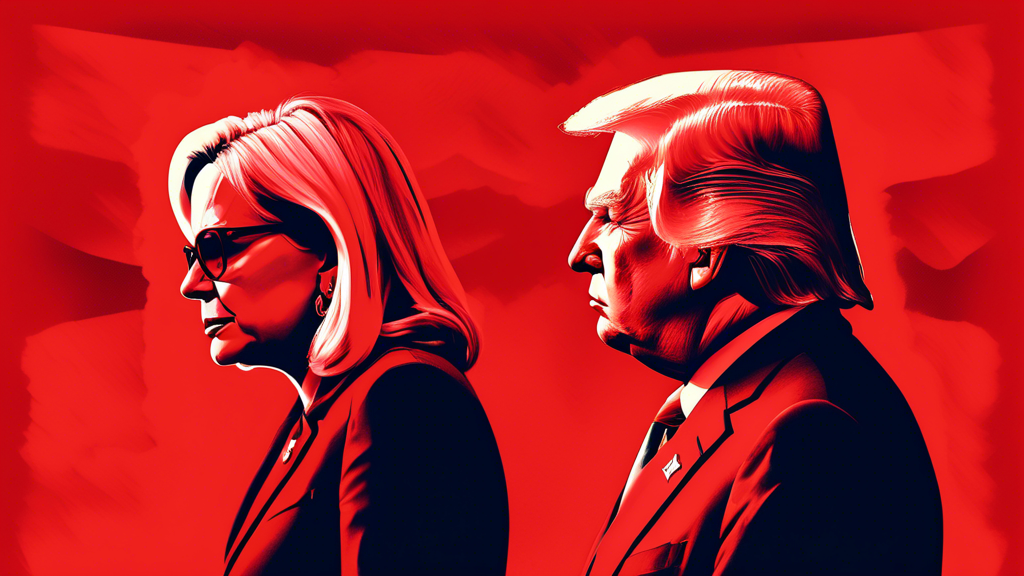
Trump’s Recent Rhetoric Towards Liz Cheney
In a recent campaign event held in Arizona, former President Donald Trump unleashed a barrage of inflammatory remarks aimed at ex-Representative Liz Cheney. Referring to her as a radical war hawk, Trump took his rhetoric to alarming new heights by suggesting she should be placed in a hazardous scenario with nine barrels aimed at her. This incendiary comment was viewed by many as a reference to a firing squad or a dangerous gunfire situation, raising concerns about the increasing tensions surrounding political discourse in America.
Understanding the Nature of the Comments
Trump’s comments were direct and startling. He elaborated, stating, Let’s put her with a rifle standing there with nine barrels shooting at her. Okay, let’s see how she feels about it. The imagery conveyed by his words carries a heavy implication, reflecting not just a personal attack but also a broader culture of hostility that is emerging in contemporary politics. It’s crucial to analyze how such statements promote division and sensationalism rather than constructive dialogue.
Political Fallout and Reactions
The backlash from Trump’s remarks has been swift and widespread. Leaders from both sides of the political spectrum have condemned the violent rhetoric. Concerns are growing about the implications of such language on the overall political environment, particularly with the 2024 elections on the horizon. Many believe that Trump’s approach not only threatens the safety of political figures but also undermines the integrity of democratic discourse.
Liz Cheney’s Forthright Response
In response to Trump’s incendiary remarks, Liz Cheney did not hold back. She described the former president’s behavior as a reflection of how dictators operate, stating, This is how dictators destroy free nations. They threaten those who speak against them with death. Cheney went on to label Trump as petty, vindictive, cruel, unstable, and declared him unfit to lead the country. Her strong response highlights the moral and ethical confrontation that this political climate demands.
In an effort to mitigate the fallout, Trump’s campaign spokesperson, Karoline Leavitt, attempted to clarify the former president’s comments. She claimed that they had been taken out of context and suggested that Trump was merely emphasizing the hypocrisy of war proponents who do not engage in battle themselves. This defense, however, has not swayed public perception, especially given the gravity of the implications of such language.
Investigations and Broader Implications
After Trump’s incendiary remarks, the Arizona Attorney General’s office is currently investigating whether his comments could be classified as a death threat under state law. This inquiry not only highlights the seriousness of the matter but also questions the boundaries of political rhetoric in an age where tensions are heightened. The implications of this investigation could resonate beyond Arizona, potentially affecting how political figures engage in future discourse.
As the 2024 election approaches, the stark divide between Trump’s aggressive rhetoric and the reactions of prominent Democratic figures is evident. Vice President Kamala Harris has described Trump’s statements as disqualifying for the presidency, stating that any individual using such violent language is clearly unsuitable for leadership. Furthermore, Cheney’s decision to campaign alongside Harris illustrates an alarming shift in political alliances that could redefine party lines in upcoming elections.
In conclusion, the fallout from Trump’s comments towards Liz Cheney serves as a sobering reminder of the divisive state of American politics. As both parties gear up for battle in key battleground states, it is crucial to remember that the fight for democracy must remain grounded in respect and civility. The ongoing dialogue between political adversaries must focus on ideas rather than incendiary language—an essential step in preserving the values we hold dear as a nation.
